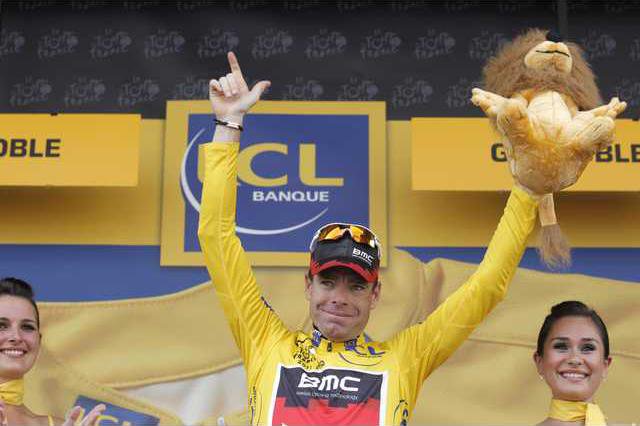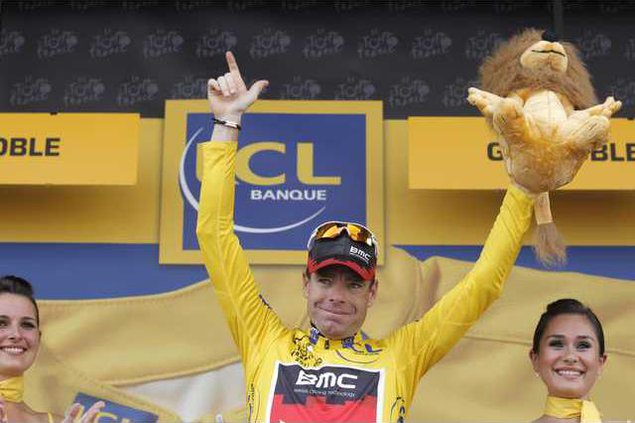GRENOBLE, France (AP) — Cadel Evans seized the Tour de France yellow jersey in the next-to-last stage Saturday, all but giving Australia its first victory in cycling’s showpiece event and capping one of the most dramatic races in years.
The two-time runner-up took the overall lead by overcoming a 57-second deficit to Andy Schleck of Luxembourg in the time trial.
A red-eyed Evans choked up on the victory podium, holding back tears before hurling the winner’s bouquet into the crowd.
“I really can’t quite believe it right now,” the 34-year-old Aussie said. “I have been concentrating on one event for so long.”
Although there is one more stage — today’s ceremonial finish along the Champs-Elysees in Paris — the leader after the time trial is almost certain to be the winner. Launching a successful attack during that flat ride is virtually impossible.
This year’s edition of the 108-year-old race was tense all the way — a riveting finish and without a serious doping blight that marred past Tours.
The Schleck brothers, knowing they had lost, embraced after the finish line of the 26-mile time trial. Evans leads Andy Schleck by 1:34, and Frank Schleck by 2:30.
The 20th stage was won by Tony Martin of Germany. Evans finished second in the stage — seven seconds behind — and was 2:31 faster than Andy Schleck.
The riders set off in reverse order of the standings. Andy Schleck had the benefit of riding last, and said beforehand he’d have the added inspiration of wearing yellow.
Riders described the course — mostly flat featuring two small hills — as quite technical, with a variety of tight turns. After morning rains doused the roads, sunshine dried them by the time the leading contenders left.
By the first intermediate time check at the 9.3-mile mark, Evans had already erased 36 seconds of his deficit to Andy Schleck and was 34 seconds faster than the elder Schleck.
At the second, at 17.1 miles, Andy Schleck’s lead had vanished — Evans was 1:32 faster. The Luxembourg rider wasn’t even among the 10 fastest riders who had crossed that point. Evans then kept gaining as the stage progressed to the finish.
The looming victory for Evans, the BMC team leader, culminated a stellar and methodical three weeks of riding. Unlike defending champion Alberto Contador and other main contenders, Evans was spared crashes. His only real problem was mechanical trouble Friday, but he recovered without any lost time.
Evans said he first saw the Tour as a 14-year-old, watching the successes of five-time champion Miguel Indurain. The Aussie spoke movingly of former coach Aldo Sassi, who “often believed in me more than I did.” The Italian died in December.
“For him today to see me now would be quite something,” Evans said.
Evans won only one stage in this Tour, the flat fourth stage. But his triumph attests to his diligent preparation as he eyed a title he has narrowly missed for years.
“Today, we went through the process, like we had the plan every day — and the plan every day was A, B, C, D,” he said. “The key aspect to our Tour is consistency.”
BMC also averted the many crashes that wreaked havoc on many teams, especially during the first week.
“We were criticized a lot in the first 10 days for not going forward enough,” said John Lelangue, BMC’s sporting director. “But that’s the strategy, to consider every stage of the Tour de France like it was the last.”
Evans’ psychological toughness had been questioned, but he showed a veteran’s skill and savvy to take cycling’s greatest prize.
“This is the victory of a complete rider,” Tour director Christian Prudhomme said. “Is the consecration of a career.”
Evans had been regarded as a perennial underachiever until he became a world champion two years ago. And he enjoyed a solid build-up to the Tour, racing less than usual so he would peak at the right moment.
This wasn’t Evans’ first come-from-behind attempt. In another next-to-last stage time trial in 2008, he trailed Carlos Sastre of Spain by 1:34. Evans erased 29 seconds and finished second overall. The previous year, he was only 23 seconds behind Contador in second place.
Those were doping-marred races. Leader Michael Rasmussen of Denmark was kicked out of the 2007 Tour for lying about his training whereabouts when he missed prerace doping tests. The next year, third-place finisher Bernard Kohl of Germany was among several riders exposed as cheats.
The International Cycling Union has since made it a top priority to root out doping, with hundreds of tests conducted at the race this year.
Evans said he doesn’t know whether the stiffer controls helped make his victory possible.
“I think the best thing I can do as an athlete is to be a good example,” Evans said. “Others can make their own opinions.”
The Schlecks — whichever one — were vying to be the first from Luxembourg to capture the Tour since Charly Gaul became the country’s only winner in 1958.
As second and third overall, they will be the first brothers to share the Tour’s winners podium on the Champs-Elysees.
“I’ll be on the podium with my brother, that’s fantastic, everybody is happy. Of course, I cannot jump in the air because I was supposed to win the Tour,” Andy Schleck said. “Congrats to Cadel. He fought until the end, rode a perfect race. So did I, but only one can win.”
Evans set to become first Australian to win Tour de France





